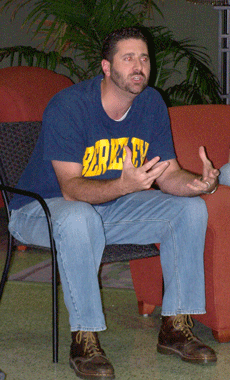Joshua Stockley, assistant professor of history and social sciences, and Brother Ray Kuhn spoke to a group of students and faculty about politics and religion Oct. 25 at St. Thomas Aquinas Catholic Student Center as part of the Catholic Stuff 101 series. Stockley opened up the discussion saying the First Amendment states Congress shall make no law respecting the establishment of religion.
He said the U.S. Constitution is a secular document of guidelines for the country and should be used to make lawful decisions and not ethical ones.
“I do not want to hear stem-cell research is wrong because God said so, I want to know the facts,” Stockley said.
Another topic addressed by Stockley was about politics in religion.
Stockley said he feels politics does not have a place in church and leaders of the church should not try to influence their congregation to vote a certain way.
“Politics should not be played in the church,” Stockley said.
He also said when religious discussions are in a political realm the discussion is not true.
Kuhn spoke next about the Constitution, saying it was based on the philosophy of the 16th century and was established to benefit the majority.
He said when people came to America, they wanted political and religious freedom and did not want to live under an official church.
The next topic Kuhn discussed was about God directly speaking to people.
He said he does not think God directly speaks to people, but instead people follow customs.
“Every time someone tells me they spoke to God, I tell them it’s funny because I was speaking to God, and he did not mention anything about it,” Kuhn said.
After he said because we are human, politics and religion sometimes mix, but as humans we should not impose our beliefs, both political and religious, on other people.
“We do not need to beat people over the head with our doctrine,” Kuhn said.
After the speakers finished their opening arguments, the audience had its turn to discuss.
Laurie Smith, government senior from Labadieville, asked, “How do politicians separate their religious views from politics when making decisions?”
Stockley answered first saying politicians need to look at the law and not moral values.
Kuhn replied saying we have to be convinced if it is wrong or right, and people should have a right to privacy.
Chris Dehart, English junior from Houma, wanted to know why people are afraid of political and religious institutions, and he said he thought democracy always works out in the end with the individual making decisions.
Stockley replied by saying the institutions have great power, and the followers believe what the leaders are saying.
“As people ascend the social ladder, their responsibility to ethics becomes greater,” Stockley said.
Joe Wallace, family and consumer science junior from New Orleans, discussed how everyday people could wear political shirts in support of someone, but if, for instance, a leader of a church would wear one and hand them out to the congregation it would be questionable.
Stockley continued the discussion by saying as a religious figure someone would in a sense sign away his or her rights to a certain amount of freedom.
Stockley said even being a professor at Nicholls changes some of his rights.
“As a professor at Nicholls, I forfeit some of my First Amendment rights,” Stockley said.








